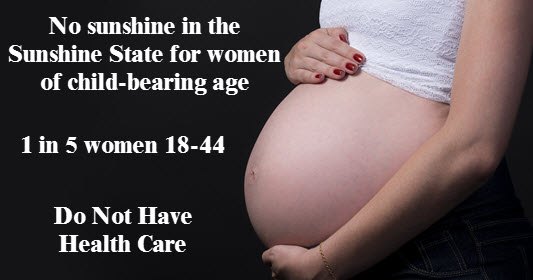Without Medicaid Expansion Florida Lags in Maternal Health
Posted May 22, 2019 10:45 am | Public News Service

 TALLAHASSEE,
FL – Failure to expand Medicaid in Florida means the
Sunshine State has one of the highest uninsured rates
for women of child-bearing age, according to a
new report by the Georgetown University Center for
Children and Families.
TALLAHASSEE,
FL – Failure to expand Medicaid in Florida means the
Sunshine State has one of the highest uninsured rates
for women of child-bearing age, according to a
new report by the Georgetown University Center for
Children and Families.
It says Medicaid expansion is helping to fill gaps in maternal health coverage, which experts say leads to healthier mothers and babies.
But Alison Yager, director of policy advocacy for the Florida Health Justice Project, points out that growing numbers of women of reproductive age - between 18 and 44 - are unable to take care of themselves prior to pregnancy and a couple months after birth, when they typically lose gap coverage.
"And that means again that these women - who are now at this vulnerable time in life where they are taking care of a new baby - are unable to take care of themselves because they've lost their connections to care and, again, any chronic conditions," Yager stressed.
The uninsured rate for these women is 19% in Florida, compared with the 9% average in states that have expanded Medicaid.
Critics of expansion say they are concerned about increased costs under the the Affordable Care Act.
The report found that states that expanded Medicaid coverage have sharply lower rates of uninsured women of child-bearing age, which has contributed to reduced infant deaths.
Joan Alker, executive director of the Georgetown University Center for Children and Families, says steady, uninterrupted coverage makes a difference for healthy birth outcomes.
"Things like maternal-depression screening and treatment, treatment for substance-use disorders, smoking cessation - all of those are benefits that Medicaid can and does cover," said Alker. "So, those are likely to have really positive, two-generational impacts."
Researchers found that Medicaid expansion improved maternal health outcomes by increasing access to preventive care, and also reduced adverse health outcomes before, during and after pregnancies.
States that expanded Medicaid also saw a 50% greater reduction in infant mortality rates, compared with states that have not expanded coverage.
The report was released in conjunction with the March of Dimes and the American College of Obstetricians and Gynecologists.
----------------------------------------
Layout and graphic by the Observer; image: MaxPixel, CC0
This piece was reprinted by the Columbia County
Observer with permission or license. It may not be
reproduced in any form without permission or license
from the source.
